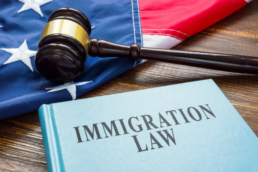Obtaining permanent residency through employment is a multi-step process.
- First, foreign nationals and employers must determine if the foreign national is eligible for lawful permanent residency under one of USCIS’ paths to lawful permanent residency.
- Second, most employment categories require that the U.S. employer complete a labor certification request (Form ETA 9089) for the applicant, and submit it to the Department of Labor’s Employment and Training Administration. Labor certification is an actual testing of the U.S. job market to determine whether a U.S. citizen is available for the offered position. The DOL will either grant or deny the certification request. Certain aliens will be relieved from this requirement.
- Third, USCIS must approve an immigrant visa petition, Form I-140, Petition for Alien Worker, for the person wishing to immigrate to the United States. The employer wishing to bring the applicant to the United States to work permanently files this petition. If a DOL certification is needed, the petition can only be filed after the certification is granted. The employer acts as the sponsor (or petitioner) for the applicant (or beneficiary) who wants to live and work on a permanent basis in the United States.
- Fourth, the State Department must give the applicant an immigrant visa number, even if the applicant is already in the United States. When the applicant receives an immigrant visa number, it means that an immigrant visa has been assigned to the applicant.
- Fifth, if the applicant is already in the United States, he or she must apply to adjust to permanent resident status after a visa number becomes available. If the applicant is outside the United States when an immigrant visa number becomes available, he or she will be notified and must complete the process at his or her local U.S. consulate office.
Preference Categories and Eligibility
Like family-based immigration, there are four categories for granting permanent residence to foreign nationals based upon employment:
EB-1 Priority workers
- Foreign nationals of extraordinary ability in the sciences, arts, education, business or athletics
- Foreign national that are outstanding professors or researchers
- Foreign nationals that are managers and executives subject to international transfer to the United States
- Note that this category does NOT require labor certification.
EB-2 Professionals with advanced degrees or persons with exceptional ability
- Foreign nationals of exceptional ability in the sciences, arts or business
- Foreign nationals that are advanced degree professionals
- Qualified alien physicians who will practice medicine in an area of the U.S. which is underserved.
EB-3 Skilled or professional workers
- Foreign national professionals with bachelor’s degrees (not qualifying for a higher preference category)
- Foreign national skilled workers (minimum two years training and experience)
- Foreign national unskilled workers
EB-4 Special Immigrants
- Foreign national religious workers
- Employees and former employees of the U.S. Government abroad
Process
An employer wishing to sponsor (or petition) for a foreign national to work in the United States on a permanent basis must file Form I-140, Petition for Alien Worker. Filing requirements differ for each of the five categories.
The Department of State is responsible for providing visa numbers to foreign nationals interested in immigrating to the United States. To find out more about the Department of State’s visa process visit the Department of State website for specific information on how to get an immigrant visa number click here.
To check the status of a visa number you can review the Department of State’s visa bulletin. Click here to view the most current visa bulletin.
Page Summary: U.S. Employers can sponsor certain foreign nationals for permanent resident status.
Ready to have Berardi on your side?
Whether you’re a business looking to hire or a professional hoping to relocate, immigration law can be complicated. But you don’t have to do it alone. Put our experience to work for you.


